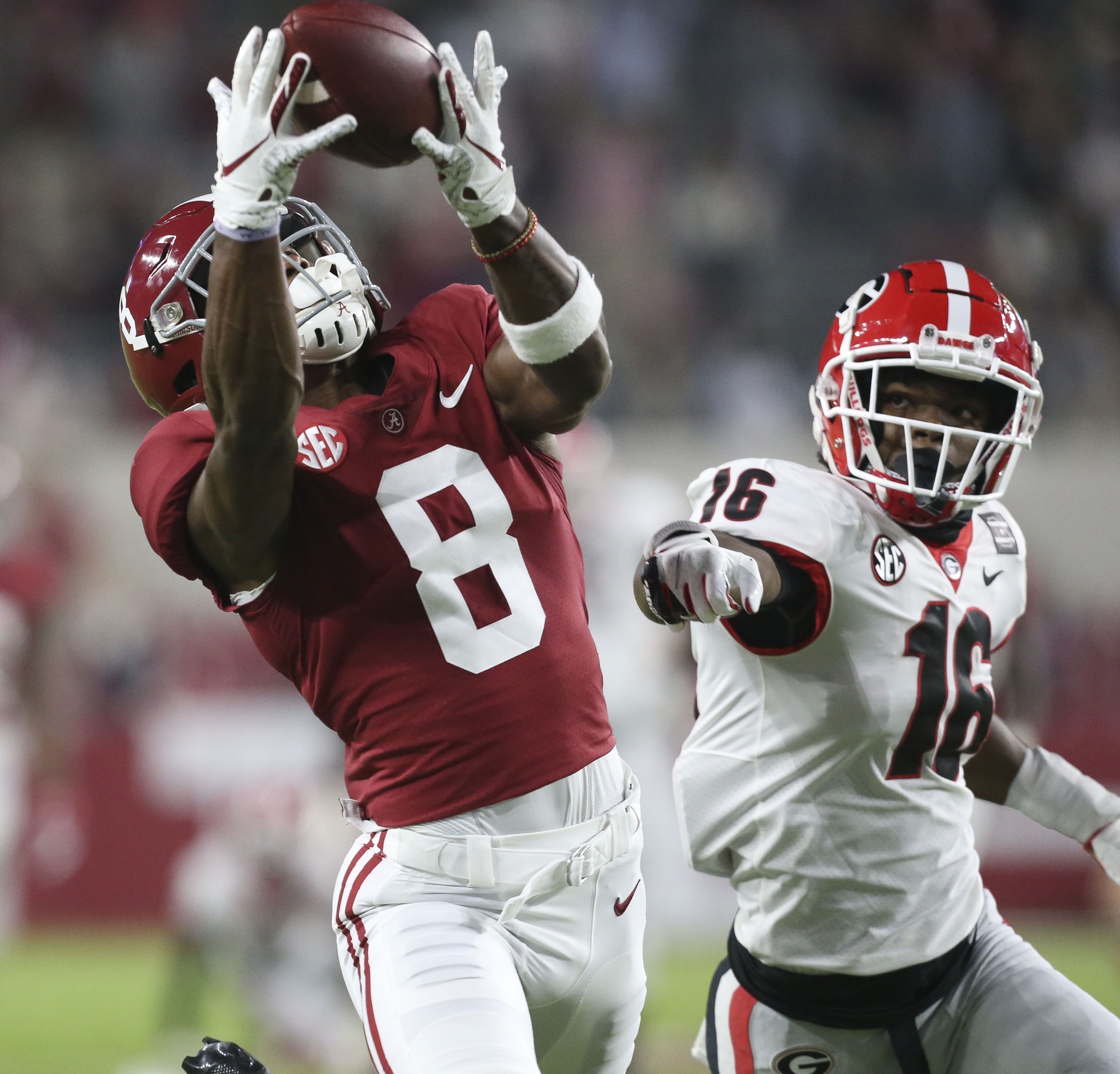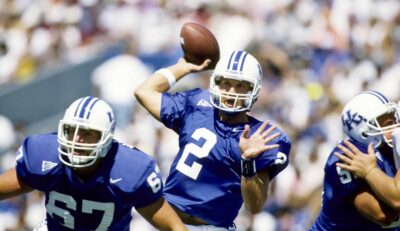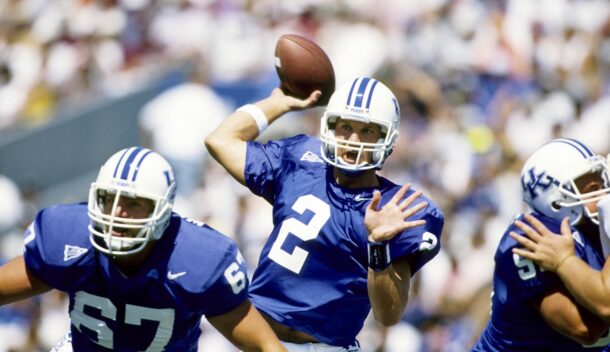
Alabama’s offense? Georgia’s defense? These 6 SEC units feel like they’re the most obvious to regress in 2021
Everyone is undefeated, but that doesn’t mean everyone is destined to improve.
For a select group of SEC units, regression feels inevitable. Part of that could be because the odds of a historically dominant unit repeating its previous performance are extremely unlikely. It could also be a matter of examining the teams with a major loss in production. It could even be recognizing that a group may have overachieved.
Regression seems like such a far-off possibility in the offseason. No coach ever comes out and says, “yep, I expect us to be worse here.” It’s always about tweaking and improving. As it should be. That makes it harder to predict regression than progression.
And as stated in my “these 7 SEC units feel like they’re the most obvious to improve” piece from earlier this week, regression is all about the number on the scoreboard. Regression is scoring 22 points a game after averaging 35. It’s surrendering 35 points per game after allowing 15 the year before. This isn’t about total yards, either. The scoreboard cashes paychecks. You get how numbers work.
For what it’s worth, we’re going to limit this to facing Power 5 competition just so that it’s a fair year-to-year comparison. With all due respect to Eastern Illinois, I don’t think it’s fair to let a 50-point effort from South Carolina skew that number when there weren’t any Eastern Illinois on the schedule in 2020. Fair enough?
So, these are the 6 SEC units who feel most obvious to take a step back in 2021:
1. Tennessee defense
2020 rank — No. 69
Why they’ll be worse — Josh Heupel’s offenses don’t exactly yield elite defenses. At least they haven’t. Call me crazy, but that seemed like an obvious reason it took Heupel 3 weeks to hire a defensive coordinator.
Time of possession doesn’t favor Heupel’s defenses, which wouldn’t bode well for Tennessee if it returned the vast majority of last year’s squad. As we know, though, even that’s not the case. The Vols went into the spring ranked No. 107 in FBS in percentage of returning defensive production. Why? Henry To’o To’o went to Alabama, Quavaris Crouch went to Michigan State, Deandre Johnson went to Miami and Bryce Thompson went to the NFL. On top of that, one of the better defensive minds in the sport, Jeremy Pruitt, well, you know.
Tennessee is a legitimate candidate to have the worst defense in the SEC in 2020. Even Vols fans will tell you that mediocrity like last year’s final number would be a massive win, though that’s probably not realistic.
2. Georgia defense
2020 rank — T-No. 16
Why they’ll be worse — If you thought Tennessee was at the bottom of the barrel in terms of percentage of returning defensive production, Georgia is on a different level. The Dawgs went into spring ranked No. 126 out of 127 FBS teams in that department. Granted, that was before the big addition of West Virginia defensive back Tykee Smith. And yes, life could be much worse for Georgia if the invaluable Jordan Davis was off to the NFL.
Still, though. Even though there’s all sorts of optimism for the likes of Nakobe Dean, Nolan Smith and Travon Walker, Georgia’s defensive regression feels inevitable. There are too many key holes to fill, especially in the secondary, in order for Kirby Smart to flirt with a top-10 defense like it did a year ago.
Georgia is in the midst of a bit of an identity shift, which will be much more evident this year than last. You no longer need to win a national championship by holding teams to 15 points. With the expected offensive improvement, this can still be a national championship team even if it regresses by a couple points per game. Ask 2019 LSU about that.
3. Alabama offense
2020 ranking — No. 2
Why they’ll be worse — Easy, Alabama fans. Nobody is saying this offense will fall off a cliff going from Steve Sarkisian to Bill O’Brien. But when you set a program record for scoring, yeah, regression seems inevitable. Then again, it felt inevitable last year when Tua Tagovailoa, Jerry Jeudy and Henry Ruggs all went off the board in the top 15 picks of the 2020 NFL Draft. Then, Mac Jones happened. And perhaps of equal importance, DeVonta Smith turned into an All-Pro NFL receiver playing on Saturdays instead of Sundays. Now, he and Jaylen Waddle are playing on Sundays.
Bryce Young can have a ridiculously good season and still not live up to the 2020 standard. We’re talking about a group that hit 41 points in 11 of 13 games and in 7 of those games, it put up half a hundred. That type of consistency is a massive challenge, especially with the turnover at receiver and with 3 starting offensive linemen off to the NFL. Combine that with losing Najee Harris, and it’s not surprising to see Alabama ranked No. 126 out of 127 FBS teams in percentage of returning production.
Jameson Williams’ addition might add a key element to the Crimson Tide offense (speed) — I’m not totally sold on John Metchie as being the next great Alabama receiver — but I wouldn’t bank on that being what allows it to somehow improve yet again. After averaging 48.5 points per game, Alabama has gotten to the point where the only place to go is down.
4. Florida offense
2020 ranking — No. 13
Why they’ll be worse — Well, let’s start with the obvious. Kyle Trask, Kyle Pitts, Kadarius Toney and Trevon Grimes were pretty darn good. That’s why Florida averaged 39.8 points per game and had the nation’s top passing attack. You already knew that. You also probably knew that Florida just had its best offense since 2008. Go figure that was Dan Mullen’s last year as Florida’s offensive coordinator.
Speaking of Mullen, Emory Jones is expected to be his first recruit-to-starter quarterback in Gainesville. Even if Jones becomes an All-SEC quarterback with Jacob Copeland and Justin Shorter becoming reliable passing game weapons, think about this. Florida went into spring ranked No. 125 out of 127 FBS teams in percentage of returning production. From 2011-20, here are the SEC offenses who averaged 40.0 points per game — that’s what Florida would need to reach in order to improve — in an entire season:
- 2012 Texas A&M
- 2013 Texas A&M
- 2014 Georgia
- 2015 Ole Miss
- 2018 Alabama
- 2019 LSU
- 2019 Alabama
- 2020 Alabama
Johnny Manziel, Todd Gurley, Laquon Treadwell, Tua Tagovailoa, Joe Burrow, DeVonta Smith … all of those teams had at least 1 of those game-changing, All-American skill players. Who’s that guy for Florida?
That’s 8 out of 138 (5.8%) SEC offenses who accomplished that feat in the last decade. Florida improving is the only way it joins that club. If that happens of those new pieces on offense, that might be Mullen’s most impressive feat yet. I just wouldn’t assume that’ll happen, and frankly, the Gators shouldn’t need to light up scoreboards in the same sort of way if that defense makes the step it’s supposed to make. The Cotton Bowl performance might have been an unfair way to gauge the 2021 offense, but it didn’t exactly suggest this group is ready to rewrite the record books.
5. Auburn offense
2020 ranking — No. 89
Why they’ll be worse — I wouldn’t be surprised if Auburn improved its 25.2 points per game overall, but if that came as a result of feasting on some non-Power 5 competition, then we’re still in the “regression” camp. Two things concern me: One is that Auburn is massive questions to answer with its pass-catchers and, really, its pass-thrower. Teams are going to load the box and make Bo Nix prove he can beat them with his arm.
Along those same lines is what’ll be asked of Tank Bigsby. He’s phenomenal … if he’s healthy. With the amount of contact that he takes on, I worry about him holding up over the course of the season, especially if Auburn has him getting 25 touches per game. To be fair, he deserves those touches. But I have this worrisome vision of an Auburn offense, in Year 1 of a new system, that is forced to play multiple games without its rock. I’d worry about that after what we saw last year, and that was with Anthony Schwartz and Seth Williams.
I foresee the defense doing a lot of the heavy lifting in Year 1 of the Bryan Harsin era.
6. South Carolina offense
2020 ranking — No. 98
Why they’ll be worse — Wait, worse than last year? How is that possible? Isn’t Will Muschamp gone?
Let’s start with the positives. Kevin Harris and MarShawn Lloyd have potential to be one of the top running back duos not just in the SEC, but all of college football. Dakereon Joyner’s emergence at receiver is also an intriguing storyline for the Gamecocks, who got Justin Stepp to leave Arkansas to return home to South Carolina.
So why won’t that group improve?
The passing game situation feels like a massive question mark. Luke Doty needs to show that he can stretch the field, and South Carolina needs to show it actually has guys who can do that. If not, this could be similar to Auburn’s potential issue of teams loading the box and daring them to throw. If Marcus Satterfield can somehow establish balance in this offense, that’d be a massive win, especially after losing the underrated Shi Smith. It’s just hard to envision that scenario with such an unknown in the passing game outside of tight end Nick Muse.
Let’s not forget that South Carolina’s offense actually averaged 31 points in those first 4 games last year. Unless Doty really takes off in his first year in the system, which doesn’t seem like a given after South Carolina averaged 14.7 points in his 3 starts last year, the Gamecocks will struggle to keep their head above water on offense.
This could be a situation in which the start is so rough that perhaps by November, the path to showing year-to-year improvement is too steep. A slight step back from the final year of the Muschamp era offense seems slightly.
Connor O'Gara is the senior national columnist for Saturday Down South. He's a member of the Football Writers Association of America. After spending his entire life living in B1G country, he moved to the South in 2015.







